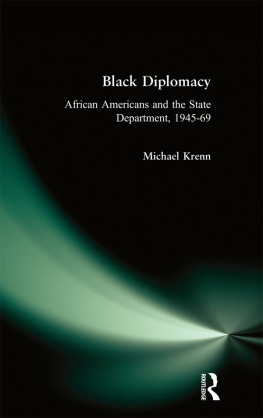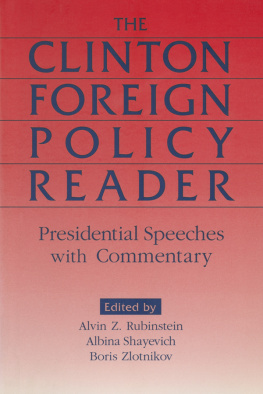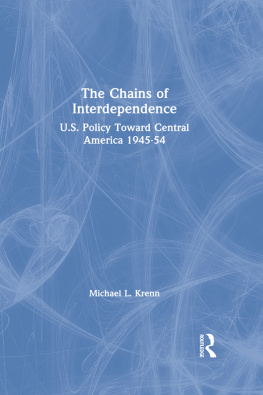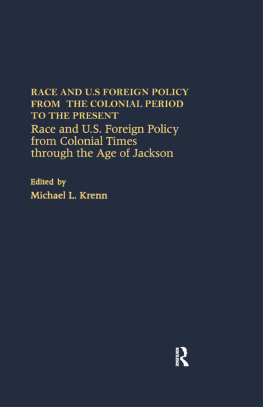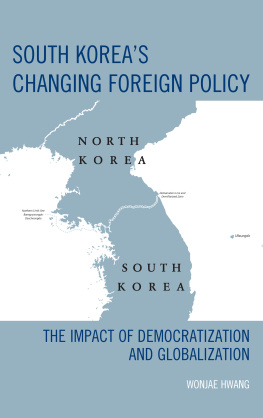First published 1999 by Garland Publishing, Inc.
This edition published 2015 by Routledge
711 Third Avenue, New York, NY 10017, USA
2 Park Square, Milton Park, Abingdon, Oxon, OX14 4RN
Routledge is an imprint of the Taylor & Francis Group, an informa business
Introduction copyright 1999 Michael L. Krenn. All rights reserved.
Library of Congress Cataloging-in-Publication Data
The impact of race on U.S. foreign policy: a reader / edited with an
introduction by Michael L. Krenn.
p. cm.
Includes bibliographical references.
ISBN 0-8153-3417-6 (alk. paper)
1. United StatesForeign relationsSocial aspects. 2. Racism
United StatesHistory. 3. United StatesRace relations. I.
Krenn, Michael L., 1957- II. Title: Race and US Foreign policy.
E183.7.R23 1999
327.73'009dc21 99-15319
CIP
ISBN 978-0-8153-3417-0 (pbk)
The interconnections between race and U.S. foreign policy have only recently come under the close scrutiny of scholars. Perhaps this is due to the fact that for many students of American diplomacy race was seen as a distinctively domestic issue, encircled by debates over civil rights, affirmative action, and discrimination. Foreign policy, at least as it was studied for generations, was viewed as being somehow disengaged or insulated from such disturbing issues as the demeaning and sometimes violent attitudes of many white Americans toward black Americans and other minority groups, and from the sufferings and protests of those oppressed. After all, it was reasoned, foreign policy involves analyses of international power relations, not the sometimes tawdry conflicts between bigots and their victims; it is made and implemented not by ignorant racists but by what some have called "the best and the brightest" people America has to offer. Furthermore, foreign policy responded to the demands of the educated and powerful elite of the nation, not to the racial minorities marginalized by American society.
Those were certainly my own perceptions when, twenty years ago, I was working on my master's thesis dealing with the U.S. policy toward Haiti during the Woodrow Wilson years. Examples of racist feelings by American policymakers were commonplace in the evidence I consulted. One particularly striking example came when Secretary of State William Jennings Bryan asked for a briefing on Haiti by a businessman with connections to that nation. After a lengthy presentation about Haiti's people, history, and culture, Bryan's first comment was, "Dear me, imagine that! Niggers speaking French!" It was, at first, tempting to simply dismiss such ugly sentiments as merely more disturbing evidence of the rampant racism in America during the Progressive era. Economics and geopolitics, not Bryan's small-minded bigotry, were the stuff of American diplomacy. Yet, reflection led me to consider whether the racism of U.S. officials could be so easily disposed of in terms of studying U.S.-Haiti relations. If one concluded that domestic policies were often made based on race (President Wilson's decision to segregate federal government offices, for instance), was it too far a stretch to conclude that race also mattered in the nation's foreign policy?
In the years since then, the study of race and U.S. foreign policy has taken on a life of its own. Spurred on in large part by the powerful civil rights movement of the 1960s, historians of America's foreign relations have reconsidered their conceptions of what the nation's foreign policy is and how it is made. New questions were asked: What were the views on race of America's diplomats, and did those views influence their words and actions? Did racism influence U.S. policies directed toward peoples of color Native Americans, Latin Americans, Asians, Africans? What was racism's role in specific foreign policy actions Manifest Destiny and the war with Mexico; the Spanish-American War and the U.S. thrusts into the Pacific and the Caribbean; the "Big Stick" policies of one Roosevelt and the "Good Neighbor" policies of another; the war in the Pacific against Japan and the dropping of the atomic bombs; and America's Cold War interventions in the Third World, particularly in Vietnam? How did the African-American population of the United States develop a foreign policy outlook, and what effect did it have on issues such as the U.S. occupation of Haiti, the Italo-Ethiopian War, the U.S. attitude toward the decolonization of Africa, and U.S. relations with South Africa?
In attempting to answer these questions and others like them, more and more scholars have come to the conclusion that race does matter, and that the study of race and U.S. foreign policy is absolutely necessary for a more complete understanding of American diplomacy. Indeed, as the selections in this volume indicate, race has played an important role in the nation's foreign relations from the time the first English colonists clambered onto the shores of the North American continent. They had already progressed rather far in defining themselves in racial terms. Ideas about the superiority of the (mythical) Anglo-Saxon race had been growing in popularity in England for years, promoted by leading philosophers, theologians, and scientists of the day. As Reginald Horsman explains in a selection taken from his book, Race and Manifest Destiny, most Englishmen had come to accept the notion that they had descended from the special and richly endowed race of Anglo-Saxons, a people particularly gifted in nation-building and in the development of free and democratic institutions that served the general welfare. This race had always traveled west, perhaps starting from somewhere in central Asia, cutting a pathway of progress through eastern Europe into the dark forests of Germany, from whence its people had eventually made their way to England.
It seemed natural, then, that many of the early English colonists in the New World considered themselves a part of the latest westward surge of the Anglo-Saxon people and institutions. These early settlers soon confronted people very different from themselves. The meetings between colonists and the Native Americans were rarely happy ones, as ideas of Anglo-Saxon superiority quickly translated into notions of Native American inferiority. The eventual success of the early colonial efforts and the concurrent decline of the Native civilizations simply provided additional evidence to support the theory that Anglo-Saxons were destined to expand, dominate, and, in this case, annihilate. The introduction of African slaves to early American society was more evidence of the growing proclivity to see other races as inferior, with little purpose other than to serve the needs of the more powerful race.
These colonial origins of a distinctly American version of racism did not dissipate after the American people became an independent nation. Indeed, the success of the American Revolution was evidence to some that a hardier and more vibrant strain of Anglo-Saxonism had taken hold in the New World. The issue of whether this republic would continue the march to the west was never much in question. Whether because of security concerns, economic necessity, simple greed, or higher notions of America's divine purpose, the United States pushed, with increasing aggressivness, ever westward. More racial clashes ensued, as the growing population of the United States rushed over the Appalachian Mountains, tearing toward the Mississippi River. As Richard Drinnon explains in his article, the racial perceptions of U.S. officials and settlers helped to guide, or at least to justify, policies toward the Native American nations that were often violent, or at best paternalistic.




